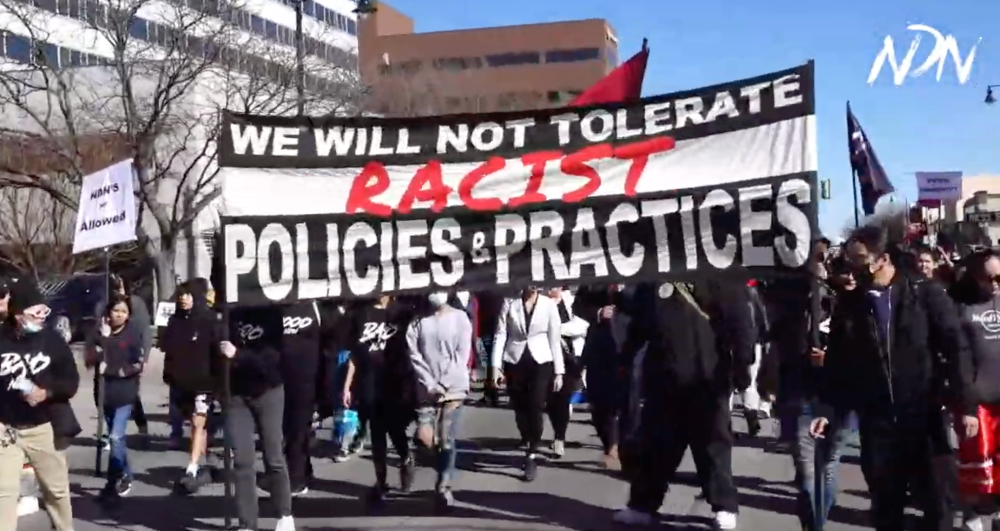
- Details
- By Native News Online Staff
Hundreds of protestors marched in the streets and gathered outside a South Dakota courthouse Wednesday to celebrate the filing of a lawsuit against a Rapid City hotel whose owner said she would ban Native Americans from property.
The demonstrators marched through downtown Rapid City with drums and carried tribal flags and banners, including one that read “We will not tolerate racist policies and practices.”
The march was organized by three advocacy organizations — NDN Collective, the American Indian Movement and Cheyenne River Grassroots Collective — that also filed the federal civil rights class action lawsuit.
Attorney Brendan Johnson, a former U.S. attorney who represents the plaintiffs in the federal lawsuit, said the “rest of the world” needs to know what’s going on in Rapid City, according to a report by the Associated Press.
“We need to be clear. We don’t file this complaint to send a message. We file this complaint because we want justice,” Johnson said during a press conference outside the courthouse.
The uproar started on Sunday, when Grand Gateway Hotel co-owner Connie Uhre wrote on Facebook: “Do [sic] to the killing that took place at the Grand Gateway Hotel on March 19, 2022 at 4 am, plus all the vandalism we have had since the Mayor and Police Department are working with the non-profit organization (Dark Money), we will no longer allow Native Americans on property, including Cheers.”
She also wrote that she "can’t tell who is a bad Native or a good Native.”
Her comments sparked outrage among Native Americand and non-Natives in the Rapid City community, spurring the hotel’s bar staff and other employees to quit in protest, according to media reports.
Harold Frazier, chairman of Cheyenne River Sioux Tribal, condemned the statements by the hotel owner, saying her comment is a reminder that since settlers have been in the Black Hills that members of the Great Sioux Nation have always been treated as a problem.
“I condemn this statement for all of the racism and discrimination this imposes on us,” said Cheyenne River Sioux Tribal Chairman Harold Frazier in a press release on Monday. “This type of behavior will no longer be tolerated in this day and age.”
“Not too long ago an Indian was murdered when someone shot him point blank in a bar in this very city,” said Frazier. “You did not hear us condemn a whole race of people, so don’t condemn our people.”
More Stories Like This
Native News Weekly (August 25, 2024): D.C. BriefsUS Presidents in Their Own Words Concerning American Indians
Star-Studded Livestream to Boost Native News Online’s Year-End Campaign
Monday Morning (December 8, 2025): Articles You May Have Missed This Past Weekend
Native News Weekly (December 7, 2025): D.C. Briefs
Help us defend tribal sovereignty.
At Native News Online, our mission is rooted in telling the stories that strengthen sovereignty and uplift Indigenous voices — not just at year’s end, but every single day.
Because of your generosity last year, we were able to keep our reporters on the ground in tribal communities, at national gatherings and in the halls of Congress — covering the issues that matter most to Indian Country: sovereignty, culture, education, health and economic opportunity.
That support sustained us through a tough year in 2025. Now, as we look to the year ahead, we need your help right now to ensure warrior journalism remains strong — reporting that defends tribal sovereignty, amplifies Native truth, and holds power accountable.
 The stakes couldn't be higher. Your support keeps Native voices heard, Native stories told and Native sovereignty defended.
The stakes couldn't be higher. Your support keeps Native voices heard, Native stories told and Native sovereignty defended.
Stand with Warrior Journalism today.
Levi Rickert (Potawatomi), Editor & Publisher

